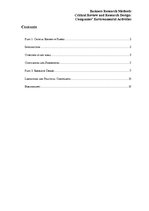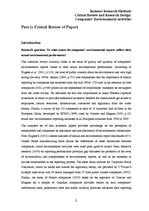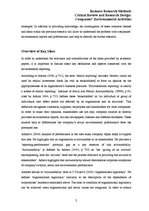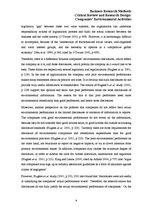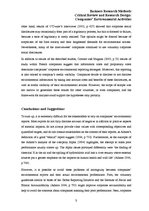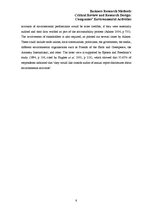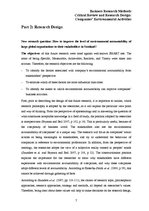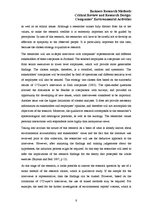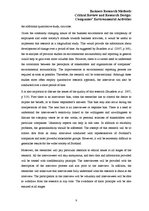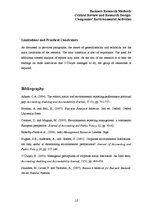-
Critical Review and Research Design: Companies’ Environmental Reports and Performance
2011. - 2020. g.
| Nr. | Sadaļas nosaukums | Lpp. |
| PART 1. | CRITICAL REVIEW OF PAPERS | 2 |
| INTRODUCTION | 2 | |
| OVERVIEW OF KEY IDEAS | 3 | |
| CONCLUSIONS AND SUGGESTIONS | 5 | |
| PART 2. | RESEARCH DESIGN | 7 |
| LIMITATIONS AND PRACTICAL CONSTRAINTS | 10 | |
| BIBLIOGRAPHY | 10 |
It is also important to discuss the issues of the quality of this research (Saunders et al. 2007, p 318). First there is an interviewer bias, when the researcher has to control the desire to impose her beliefs, or to frame respondent’s answers. This bias may also occur during the interpretation of data. The next bias is an interviewee or response bias. There is a need to understand the interviewee’s sensitivity linked to the willingness and unwillingness to discuss the company where he or she works, or personal relations of stakeholders with particular companies. Unanimity aspects can help in this case. In addition to reliability problems, the generalisability should be addressed. The attempt of this research will be to collect data from as many interviews conducted with representatives of Scotland’s companies and most powerful stakeholder groups. However, it will be extremely difficult to generalise results for the wider society of Scotland.
Moreover, the researcher will pay particular attention to ethical issues at all stages of the research. All the interviewees will stay anonymous, and their data and information provided will be treated with confidentiality principle. The interviewees will be provided with the description of the interview process and aim prior to the interview. In addition, the researcher will make sure that interviewees fully understand what the research is about at the interview. The participation in the interview will be voluntary and interviewees will be able to withdraw from the research at any time. The avoidance of harm principle will be also ensured at all stages.
…
This literature review critically looks at the issue of quality and quantity of companies’ environmental reports linked to their actual environmental performance. According to Hughes et al., the level of public concern about the environment was very high during the early 1990s. Adams also emphasises that the importance of ethical reporting by companies has increased since the mid-1980s. O’Dwyer in his research on Irish companies points out the dependence of corporations’ existence on the support from the wider society. He discusses the fact that corporations in many Western capitalist economies in return to provided substantial economic benefits for communities get access to employees, natural resources, infrastructure, customers and legitimacy from the wider society. The analysed set of four academic papers provides knowledge on the perception of stakeholders and companies on disclosure and non-disclosure of environmental information. First, Hughes’s (2001) content analyses of annual and environmental report disclosures of 51 United States manufacturing firms shows the differences of these disclosures between companies, which environmental activities were rated poor, good or mixed. Next, Adams’s research (2004) on reporting-performance portrayal gap discusses the problems of the level of accountability and completeness of environmental reports, as well as the necessity to include stakeholders in the reporting process. The ideas about motives for Corporate Social Disclosure, which lie inside and outside the legitimacy theory, are provided by O’Dwyer’s in-depth interviews with 29 senior managers from 27 Irish public limited companies (2002). In addition to providing knowledge, the investigation of these common themes and ideas within the previous research will allow to understand the problem with companies’ environmental reports and performance, and help to identify the further research.

